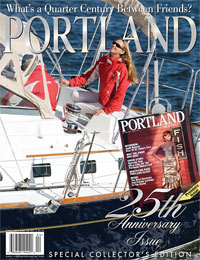 Pepperclub co-owner Eddie Fitzpatrick takes a walk down food memory lane for a retrospective article on the 25th anniversary of Portland magazine.
Pepperclub co-owner Eddie Fitzpatrick takes a walk down food memory lane for a retrospective article on the 25th anniversary of Portland magazine.
Twenty-five years ago, a new wave of restaurants in Portland dazzled diners and earned raves from The Atlantic and New England Monthly. Among them: Swan Dive, Alberta’s, L’Antibes, Brattle Street, The Vinyard, and 34 Exchange. At the time, Eddie Fitzpatrick was editor of the Maine Sunday Telegram. Today, he co-owns Pepperclub…
In the later part of the article Fitzpatrick also offers his perspective on the last few years of expansion in the restaurant industry in Portland.
A second article later in the magazine also provides another point of view on Portland restaurant past and present.
Back in the ’80’s, Portland had “just about a dozen feature restaurants,” radiating from the restored brick wharehouses of the Old Port, recalls Dick Grotton, president and CEO of the Maine Restaurant Association…
The second article isn’t available online but the new issue of Portland magazine should be available at your local newsstand and you can read the article on page 84.
